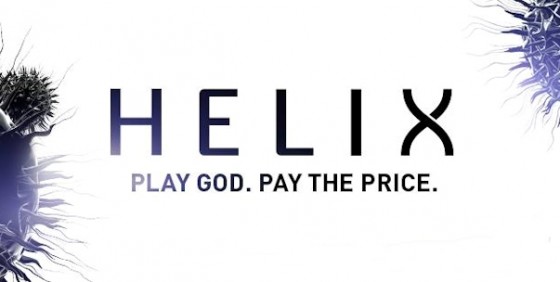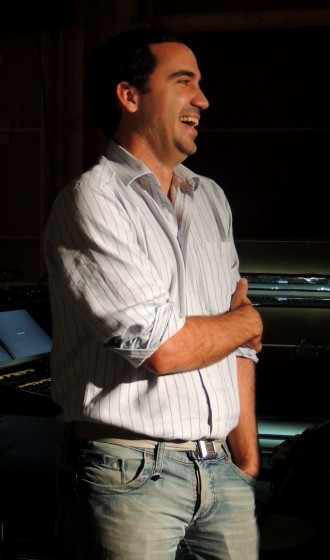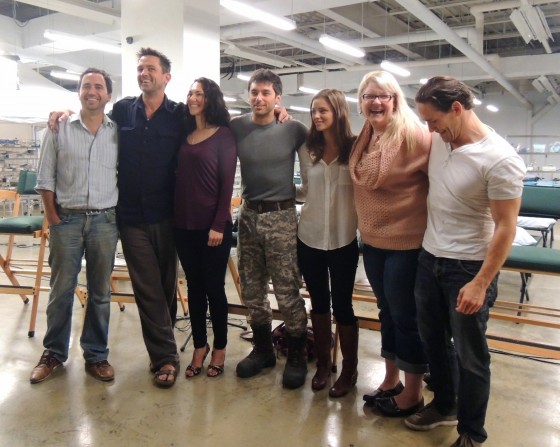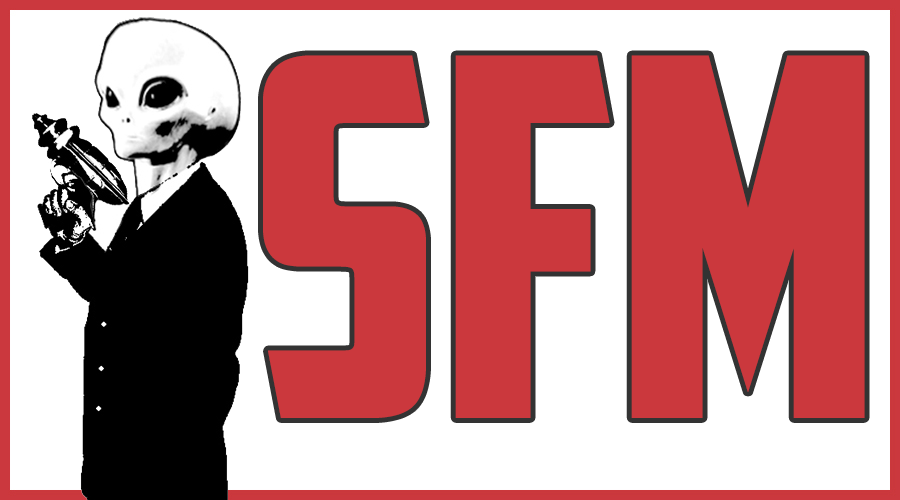
We’ve been telling you about Syfy‘s new series Helix since it was picked up straight to series back in March. We knew it was something about a disease in a lab in the arctic, but not much else. Since then we’ve seen a synopsis and a trailer (reprinted below if you need a refresher), but questions remain.
I learned a lot more about the show when I visited the Montreal set last month; you can see some of those photos here. It was there that then-Syfy President of Original programming Mark Stern called Helix a “very serialized” show, and there that I met the creator of Helix, former economist Cameron Porsandeh (on the left with cast).
While in Montreal I also learned from a Syfy exec that this is the show to watch for those of us who love good, meaty, smart, challenging science fiction. “Very” serialized, smart, with great sets; I was totally in for this show. But it was in talking with creator Cameron Porsandeh that I learned about particular elements of Helix that make it even more intriguing. Just wait until you see.
From economist to screenwriter
First, though, a little about his background. It’s one of the better backstories I’ve read about someone in the entertainment industry. Porsandeh had for a number of years been an economist, and was traveling in Africa when he saw a boy in a village, “and he was in a community where I’m fairly certain being gay wasn’t tolerated, and he was gay. I know that because the people in the community sort of told me.
And I remember him watching Will and Grace. I remember the look on his face and how happy he looked. I realized in that moment that there are lots of ways to make the world a better place. I think economics and politics are good ways and I think they’re important ways. I think another way is just letting people know that there’s a big world out there, and there are people like them. And frankly even on a more simplistic level, I think just entertaining people has value. And I think that was the moment that really pushed me into writing for television as a career, and I did, I made the leap right after that.
But wait, there’s more. Once he had made the move, he had an idea for a series. He pitched it to his agent, and they were “a little bit lukewarm on it, but they said if you think you can do it, you should.
So I took a stab at it and we sent it over to Sony [Pictures Television] and Lynda Obst, she takes a real interest in science, she did Contact and really sort of prides herself on the subject, and she saw something in it. So I developed it over at Sony for probably about six months. Then they said “if you could work with anyone on this project, who would you want to do it with?” And I said, “Ron Moore” sort of like it’s a fantasy, sort of like “who would you want to date if you could date anyone,” and I threw his name out the way you would throw a movie star’s name out. They sent it over to him and he was interested so he got on board. Then together we came up with an overarching mythology that would extend over the course of the entire series, then he and I together pitched it to Syfy.
His second script. Sony. Ron Moore. Syfy. Series. Just like that. Don’t worry, he knows that his story is unusual. But he got a great response from the crowd at Comic-Con when he told that story. “There’s something nice about looking at a guy who, two years ago, was one of them and had an idea, and now I have my own show on Syfy, and I think a lot of people, that’s their fantasy too, and I kinda got to live it out. I feel very very grateful.”
Serial-philes take note
He’s also grateful to Ron Moore and the work he did on Helix. In explaining what Moore contributed, Porsandeh also got into one of the more interesting twists of Helix, so head’s up, serial-philes: “I really think he’s a sort of master in this genre if not the master, and what he’s contributed, there’s no other word but just grateful… The whole virus element, it’s an important part of our story, but it’s really the entryway to it, and once we find ourselves halfway through the first season, we’ll find that it’s really something much much bigger than that, and Ron was integral in making the ‘much much bigger’ part a reality.”
WHAT? WHAT IS IT? Apparently we’ll have to wait and see. He went on:
While this is a virus story, it’s very quickly something much much bigger. What’s going on in this base has implications for the entire planet, and that’s really sort of integral. I like small stories with implied build. They take place in one location but the ramifications affect everyone. One thing that’s very cool is that there are things going on all over the world that affect all of us all the time, that we don’t even know about.
Not flashbacks, but…
And here’s the second bit of an interesting twist, and it’s one that I cannot wait to see played out on the screen. During the panel discussion portion of the set tour, Porsandeh had referenced revealing aspects of the characters personal lives, which prompted me to ask him afterwards if they would be using flashbacks as a storytelling device, a la Lost. No, not flashbacks… “I think flashbacks are a great narrative device , but we really wanted to keep the action in the base and in the arctic circle, and we tried to think of what was a clever way to have the same effect without resorting to flashbacks, and what we landed on was hallucinations.
When you watch (a flashback), there’s an element of objectivity into it, that you’re seeing the truth of what happened. But a hallucination is going on in someone’s mind. And you can still have memories, but you know in a hallucination it’s distorted by what a person’s going through in the moment. So what we’re really trying to do is mine that same space, but with a device that we think is not only better for the kind of story we’re telling, but also more interesting, given what our characters are going through in that exact moment. And you know disease often comes hand in hand with hallucinations too, so it’s a more organic fit to our story.
Viewers won’t necessarily know that what they’re watching is an hallucination from the start, but “it’s not a mystery we’re going to hold for a long time, because the idea that they are hallucinations has value in itself. So it’s not so much of a trick but more ‘oh my God, look what’s going on in this character’s mind”. I asked Porsandeh if there would be some sort of obvious or subliminal clue that what we’re watching is an hallucination, like Lost’s “side whoosh” when it flashed sideways, but he didn’t know at that point in the production. What he does know is that “we have some really fun hallucinations in there.” I bet.
One day per episode
 That’s right. One day per episode. Yes, consecutive days. Porsandeh had said at the panel that this was an important part of the initial pitch, so I asked him later to talk more about it. “We think that’s really integral to this story. There are a lot of stories you couldn’t tell in 13 days. This is one that you can tell, and this is one that is better because it’s only 13 days long. We definitely lean into that.” It isn’t a new concept, but it’s definitely unusual, and “one day per episode is the perfect way to structure our story, and we think it keeps it moving in a really fun way.”
That’s right. One day per episode. Yes, consecutive days. Porsandeh had said at the panel that this was an important part of the initial pitch, so I asked him later to talk more about it. “We think that’s really integral to this story. There are a lot of stories you couldn’t tell in 13 days. This is one that you can tell, and this is one that is better because it’s only 13 days long. We definitely lean into that.” It isn’t a new concept, but it’s definitely unusual, and “one day per episode is the perfect way to structure our story, and we think it keeps it moving in a really fun way.”
And here’s another head’s up for the serialphiles: “We will end this first season less than two weeks after we started, and that’s an important part of the story.”
“One day per episode. No one will be able to accuse us of moving slowly,” he laughed. “The story really ramps up and accelerates and moves faster and faster and faster, and I really like that about it. I like getting answers, but I also like there to be important action in every episode, and I think we’re achieving that.”
THIS season is in the arctic…
So, how many seasons might this show go? “I don’t have a hard number. I can see many seasons of this because this season is taking place in the arctic but the wonderful thing about viruses is that they spread.” Yes, I’m sure he meant “wonderful” in terms of sci-fi storytelling. “And on top of that, as our story opens up, we’re gonna see it has stakes for the entire planet, so I don’t see any sort of cap for how long we can go.”
Then he hinted at something perhaps a little different for next season. “A lot of shows tell season-long mysteries over and over again, shows like Damages or even The Shield. I think there are an awful lot of stories that we could tell in this narrative structure. I hope many many many.”
Mark Stern called it “very serialized” – “he’s right”
Given that description by Mark Stern, and given that Porsandeh agrees with it, I had to ask whether we’d be getting any resolution to any major questions by the end of the first season, and whether I can tell my friends it’s safe to watch the show even before we know if there will be a second season.
I think we all know the pain of having a show we love yanked out from underneath us before we know what happened. By the end of our first season a lot of the initial mysteries will be explained, and that’s really really important to us. I am absolutely certain that, by the end of the first season, we will have an idea what’s going on, not only in the base but we will have hints of what the larger story is. So yes, there will be answers. And we’re very very conscious of making sure of that, making sure there will be answers on a regular basis, but absolutely before the first season concludes.
Unfortunately, whether a second season will continue on in the arctic or go elsewhere is one of the mysteries that he had to withhold.
Science is really scary
What else does he want potential fans to know about Helix? “I would say that science is really really cool, and it’s also really really scary, and that’s something that we play with a lot. The world is changing very very quickly, and the science we’re talking about in Helix isn’t 30, 40, 50 years in the future. It’s 3, 4, 5; it’s right around the corner. And it’s stuff we should be aware of. We are science fiction, and we take advantage of the fact that we’re fiction, but the core of the science, it’s real, and I think that really elevates the story into a new place.”
As we were winding up our chat, he said that “January feels right around the corner…” I really can’t wait. Thanks so much to Cameron Porsandeh for taking the time to give us the inside scoop on his first series.
Here’s another look at that fact sheet and trailer:
ABOUT HELIX
Helix is an intense thriller about a team of scientists from the Centers for Disease Control who travel to a high-tech research facility in the Arctic, Arctic Biosystems, to investigate a possible disease outbreak, only to find themselves pulled into a terrifying life-and-death struggle that may hold the key to mankind’s salvation or total annihilation. However, the lethal threat is just the tip of the iceberg, and as the virus evolves, the chilling truth begins to unravel.
The 13-episode Syfy drama is executive produced by Ronald D. Moore (Battlestar Galactica, Outlander), Steven Maeda (Lost, The X-Files) who is also showrunner, and Lynda Obst (Sleepless in Seattle, Contact). Cameron Porsandeh, who wrote the pilot, will serve as a Co-Executive Producer.
Billy Campbell (The Killing, Killing Lincoln) stars as Dr. Alan Farragut, leader of the Centers for Disease Control outbreak field team called upon to investigate and control a potential outbreak. Hiroyuki Sanada (The Wolverine, 47 Ronin) also stars as Dr. Hiroshi Hatake, director of Arctic Biosystems and its mysterious viral research program.
Helix also stars Kyra Zagorsky (Supernatural) as Dr. Julia Walker, Mark Ghanimé (Emily Owens, M.D.) as Major Sergio Balleseros, Jordan Hayes (House at the End of the Street) as Dr. Sarah Jordan, Meegwun Fairbrother as Daniel Aerov, Catherine Lemieux (White House Down) as Dr. Doreen Boyle and Neil Napier (Riddick) as Dr. Peter Farragut.
Prolific director and producer Jeffrey Reiner is directing the premiere episode of Helix. Reiner directed multiple episodes of notable television series such as the critically acclaimed and award-winning Friday Night Lights, Awake and The Event.
Helix is produced by Tall Ship Productions, Kaji Productions and Lynda Obst Productions in association with Sony Pictures Television.
Trailer: Helix – Season 1: Official
Seriously. Can’t. Wait.
Helix, starring Billy Campbell, Hiroyuki Sanada, Kyra Zagorsky, Mark Ghanimé, Jordan Hayes, Meegwun Fairbrother, Catherine Lemieux and Neil Napier, premieres January 10 at 10/9c on Syfy.


